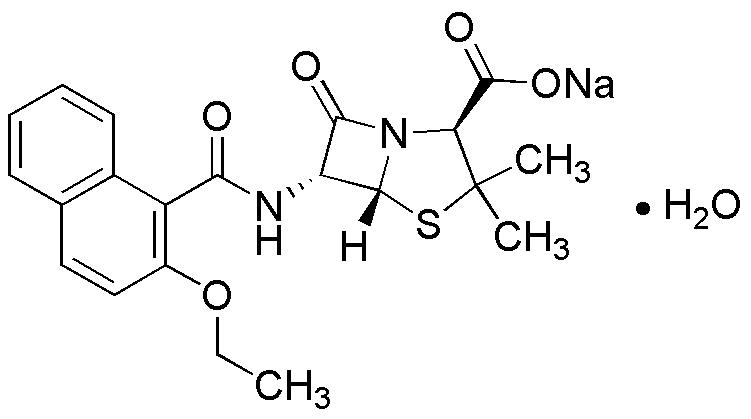Nafcillin is widely utilized in research focused on:
- Antibiotic Therapy: Primarily used to treat infections caused by penicillinase-producing staphylococci, making it essential in hospitals for managing resistant bacterial infections.
- Pharmaceutical Development: Employed in the formulation of new antibiotic drugs, aiding researchers in developing more effective treatments against resistant strains.
- Clinical Research: Used in studies assessing the efficacy of antibiotic treatments, providing valuable data on dosage and administration in clinical settings.
- Veterinary Medicine: Applied in treating bacterial infections in animals, ensuring the health of livestock and pets, which is crucial for veterinary practices.
- Microbiology Studies: Serves as a tool for microbiologists to study bacterial resistance mechanisms, helping to inform future antibiotic development strategies.
Informations générales
Propriétés
Sécurité et réglementation
Applications
Nafcillin is widely utilized in research focused on:
- Antibiotic Therapy: Primarily used to treat infections caused by penicillinase-producing staphylococci, making it essential in hospitals for managing resistant bacterial infections.
- Pharmaceutical Development: Employed in the formulation of new antibiotic drugs, aiding researchers in developing more effective treatments against resistant strains.
- Clinical Research: Used in studies assessing the efficacy of antibiotic treatments, providing valuable data on dosage and administration in clinical settings.
- Veterinary Medicine: Applied in treating bacterial infections in animals, ensuring the health of livestock and pets, which is crucial for veterinary practices.
- Microbiology Studies: Serves as a tool for microbiologists to study bacterial resistance mechanisms, helping to inform future antibiotic development strategies.
Documents
Fiches de données de sécurité (FDS)
La FDS fournit des informations de sécurité complètes sur la manipulation, le stockage et l’élimination du produit.
Spécifications du produit (PS)
Le PS fournit une description complète des propriétés du produit, notamment sa composition chimique, son état physique, sa pureté et les exigences de stockage. Il détaille également les plages de qualité acceptables et les applications prévues du produit.
Certificats d'analyse (COA)
Recherchez des certificats d'analyse (COA) en saisissant le numéro de lot du produit. Les numéros de lot et de lot se trouvent sur l'étiquette d'un produit, après les mots « Lot » ou « Lot de fabrication ».
Numéro de catalogue
Numéro de lot/série
Certificats d'origine (COO)
Ce certificat d'exploitation confirme le pays dans lequel le produit a été fabriqué, et détaille également les matériaux et composants utilisés et s'il est issu de sources naturelles, synthétiques ou autres sources spécifiques. Ce certificat peut être requis pour les douanes, le commerce et la conformité réglementaire.
Numéro de catalogue
Numéro de lot/série
Fiches de données de sécurité (FDS)
La FDS fournit des informations de sécurité complètes sur la manipulation, le stockage et l’élimination du produit.
DownloadSpécifications du produit (PS)
Le PS fournit une description complète des propriétés du produit, notamment sa composition chimique, son état physique, sa pureté et les exigences de stockage. Il détaille également les plages de qualité acceptables et les applications prévues du produit.
DownloadCertificats d'analyse (COA)
Recherchez des certificats d'analyse (COA) en saisissant le numéro de lot du produit. Les numéros de lot et de lot se trouvent sur l'étiquette d'un produit, après les mots « Lot » ou « Lot de fabrication ».
Numéro de catalogue
Numéro de lot/série
Certificats d'origine (COO)
Ce certificat d'exploitation confirme le pays dans lequel le produit a été fabriqué, et détaille également les matériaux et composants utilisés et s'il est issu de sources naturelles, synthétiques ou autres sources spécifiques. Ce certificat peut être requis pour les douanes, le commerce et la conformité réglementaire.


